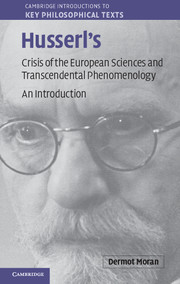Book contents
- Frontmatter
- Contents
- Acknowledgements
- Abbreviations
- Introduction
- Chapter 1 Husserl’s life and writings
- Chapter 2 Husserl’s Crisis
- Chapter 3 Galileo’s revolution and the origins of modern science
- Chapter 4 The crisis in psychology
- Chapter 5 Rethinking tradition
- Chapter 6 Husserl’s problematical concept of the life-world
- Chapter 7 Phenomenology as transcendental philosophy
- Chapter 8 The ongoing influence of Husserl’s Crisis
- Bibliography
- Index
- References
Introduction
Published online by Cambridge University Press: 05 November 2012
- Frontmatter
- Contents
- Acknowledgements
- Abbreviations
- Introduction
- Chapter 1 Husserl’s life and writings
- Chapter 2 Husserl’s Crisis
- Chapter 3 Galileo’s revolution and the origins of modern science
- Chapter 4 The crisis in psychology
- Chapter 5 Rethinking tradition
- Chapter 6 Husserl’s problematical concept of the life-world
- Chapter 7 Phenomenology as transcendental philosophy
- Chapter 8 The ongoing influence of Husserl’s Crisis
- Bibliography
- Index
- References
Summary
Introducing Husserl’s Crisis
This book offers an explanatory and critical introduction to Edmund Husserl’s last work, The Crisis of European Sciences and Transcendental Phenomenology (1936 and 1954, hereafter ‘Crisis’), a disrupted, partially published and ultimately unfinished project, written when its author was in his late 70s, struggling with declining health and suffering under the adverse political conditions imposed by the German National Socialist Regime that had come to power in 1933. The Crisis is universally recognized as his most lucidly written, accessible and engaging published work, aimed at the general educated reader as an urgent appeal to address the impending crises – scientific, moral and existential – of the age. Husserl is writing with the authority of a life-time of practice as a phenomenologist and with a fluidity previously not often found in his tortured prose. There is the strong sense of a philosopher with a mission, a mission to defend the very relevance of philosophy itself in an era defined both by astonishing scientific and technological progress and by political barbarism. The Crisis is also, undoubtedly, Husserl’s most influential book, continuing to this day to challenge philosophers reflecting on the meaning of the achievements of the modern sciences and their transformative impact on human culture and on the world as a whole. The Crisis of the European Sciences is, by any measure, a work of extraordinary range, depth and intellectual force. It reveals a thinker who, still in possession of his subject, is embarking on a powerful and sustained defence of the very phenomenology he himself had been instrumental in developing and which he was attempting to rescue from the current generation of philosophers who, he claimed, had misunderstood his efforts.
- Type
- Chapter
- Information
- Husserl's Crisis of the European Sciences and Transcendental PhenomenologyAn Introduction, pp. 1 - 18Publisher: Cambridge University PressPrint publication year: 2012



